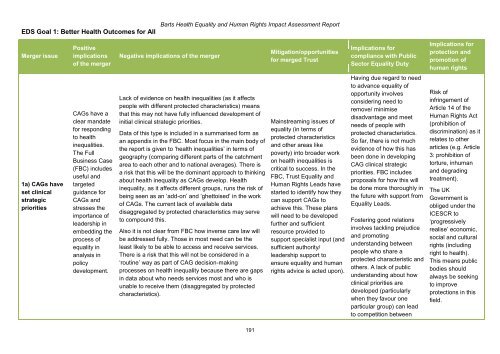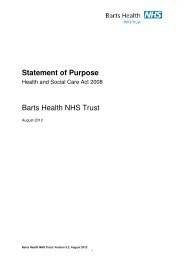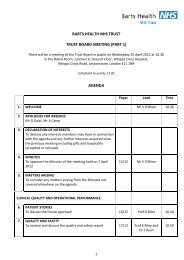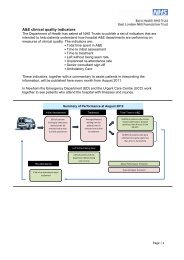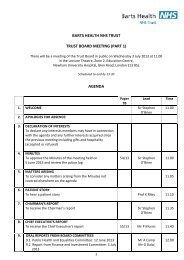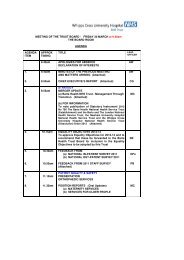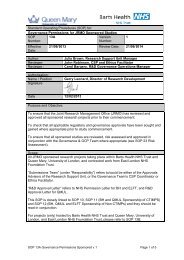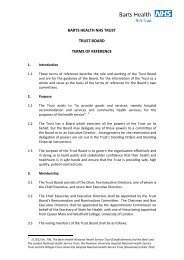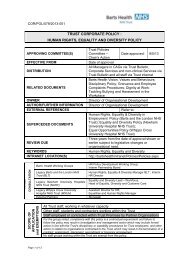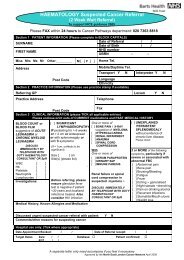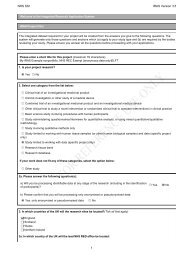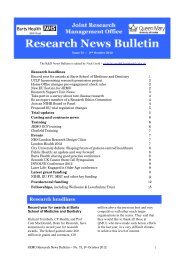Barts Health Equality and Human Rights Impact Assessment Report
Barts Health Equality and Human Rights Impact Assessment Report
Barts Health Equality and Human Rights Impact Assessment Report
- No tags were found...
Create successful ePaper yourself
Turn your PDF publications into a flip-book with our unique Google optimized e-Paper software.
EDS Goal 1: Better <strong>Health</strong> Outcomes for All<strong>Barts</strong> <strong>Health</strong> <strong>Equality</strong> <strong>and</strong> <strong>Human</strong> <strong>Rights</strong> <strong>Impact</strong> <strong>Assessment</strong> <strong>Report</strong>Merger issuePositiveimplicationsof the mergerNegative implications of the mergerMitigation/opportunitiesfor merged TrustImplications forcompliance with PublicSector <strong>Equality</strong> DutyImplications forprotection <strong>and</strong>promotion ofhuman rights1a) CAGs haveset clinicalstrategicprioritiesCAGs have aclear m<strong>and</strong>atefor respondingto healthinequalities.The FullBusiness Case(FBC) includesuseful <strong>and</strong>targetedguidance forCAGs <strong>and</strong>stresses theimportance ofleadership inembedding theprocess ofequality inanalysis inpolicydevelopment.Lack of evidence on health inequalities (as it affectspeople with different protected characteristics) meansthat this may not have fully influenced development ofinitial clinical strategic priorities.Data of this type is included in a summarised form asan appendix in the FBC. Most focus in the main body ofthe report is given to ‘health inequalities’ in terms ofgeography (comparing different parts of the catchmentarea to each other <strong>and</strong> to national averages). There isa risk that this will be the dominant approach to thinkingabout health inequality as CAGs develop. <strong>Health</strong>inequality, as it affects different groups, runs the risk ofbeing seen as an ‘add-on’ <strong>and</strong> ‘ghettoised’ in the workof CAGs. The current lack of available datadisaggregated by protected characteristics may serveto compound this.Also it is not clear from FBC how inverse care law willbe addressed fully. Those in most need can be theleast likely to be able to access <strong>and</strong> receive services.There is a risk that this will not be considered in a‘routine’ way as part of CAG decision-makingprocesses on health inequality because there are gapsin data about who needs services most <strong>and</strong> who isunable to receive them (disaggregated by protectedcharacteristics).Mainstreaming issues ofequality (in terms ofprotected characteristics<strong>and</strong> other areas likepoverty) into broader workon health inequalities iscritical to success. In theFBC, Trust <strong>Equality</strong> <strong>and</strong><strong>Human</strong> <strong>Rights</strong> Leads havestarted to identify how theycan support CAGs toachieve this. These planswill need to be developedfurther <strong>and</strong> sufficientresource provided tosupport specialist input (<strong>and</strong>sufficient authority/leadership support toensure equality <strong>and</strong> humanrights advice is acted upon).Having due regard to needto advance equality ofopportunity involvesconsidering need toremove/ minimisedisadvantage <strong>and</strong> meetneeds of people withprotected characteristics.So far, there is not muchevidence of how this hasbeen done in developingCAG clinical strategicpriorities. FBC includesproposals for how this willbe done more thoroughly inthe future with support from<strong>Equality</strong> Leads.Fostering good relationsinvolves tackling prejudice<strong>and</strong> promotingunderst<strong>and</strong>ing betweenpeople who share aprotected characteristic <strong>and</strong>others. A lack of publicunderst<strong>and</strong>ing about howclinical priorities aredeveloped (particularlywhen they favour oneparticular group) can leadto competition betweenRisk ofinfringement ofArticle 14 of the<strong>Human</strong> <strong>Rights</strong> Act(prohibition ofdiscrimination) as itrelates to otherarticles (e.g. Article3: prohibition oftorture, inhuman<strong>and</strong> degradingtreatment).The UKGovernment isobliged under theICESCR to‘progressivelyrealise’ economic,social <strong>and</strong> culturalrights (includingright to health).This means publicbodies shouldalways be seekingto improveprotections in thisfield.191


